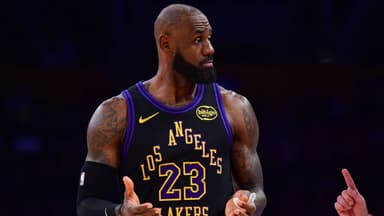Kobe Bryant left a legacy that will continue long after his death, as a basketball player, a father and a deep thinker. Kobe’s Mamba mentality is the epitome of his ethos to constantly push himself to be the very best.
Advertisement
The Mamba mentality lives on in NBA players today, but also with other athletes and through all walks of life. You don’t have to have a Hall of Fame jump shot to live like Kobe did, you just have to strive to be better each day than you were the last.
Robert Horry played with Kobe on the Los Angeles Lakers from 1997-2003. In that time, the Lakers won three rings, and Horry got to see up close and personal what made Kobe so great. On his Big Shot Bob podcast yesterday, he described what set the Black Mamba apart from everybody else.
“For me, I always think about the moment I met him, and how he was just wanting to learn about Dream, his footwork,” Horry said. He’s of course referring to his former Houston Rockets teammate Hakeem Olajuwon, whose legendary post moves helped the Rockets win back-to-back titles in the mid-’90s.
“He was always studying players that came before him,” Horry said. “And when I say studying, I mean he’s breaking down film watching every intricate part of their move. We watch film, we don’t break it down. We might rewind it and say, ‘Oh so he did this,’ but no, this dude was an assassin when it comes to details.”
Kobe famously emulated Michael Jordan early in his career, from his moves to his mannerisms to his posture. It’s eerie watching video of Michael and Kobe side by side, and that’s something only achievable if someone a) really pays attention to every detail, and b) has the talent to pull it off.
Horry said that Kobe’s mental preparation is what allowed him to become great. “Those wild horses, you know how crazy they are until you break them? And then they become this refined, great athlete. That’s how Kobe was, because I got to see all of it, so it was a blessing.”
Eddie Murphy had the voice and moves to toggle from a dead-on impersonation of Stevie Wonder to an uncannily accurate Michael Jackson, but almost anyone else could never dream of coming close to even one of those music legends. Kobe had the talent and work ethic to take the best parts from other all-time great and craft it into something that was all his.
Horry was fortunate to spend so much of his career playing alongside guys like Olajuwon, Kobe, Shaq and Tim Duncan. His seven rings are a testament to that, but it’s also fair to say that none of those legends would have been quite as successful if they didn’t have Horry knocking down clutch playoff shots.
Horry was a different kind of assassin than Kobe. He may not have watched film the same way, but he was unfailingly fearless in the biggest moments. His buzzer-beating 3-pointer against the Kings in Game 4 of the 2002 Western Conference Finals tied that series at two games apiece, giving the Lakers a chance to ultimately pull through in seven games on their way to the final piece of their three-peat.








